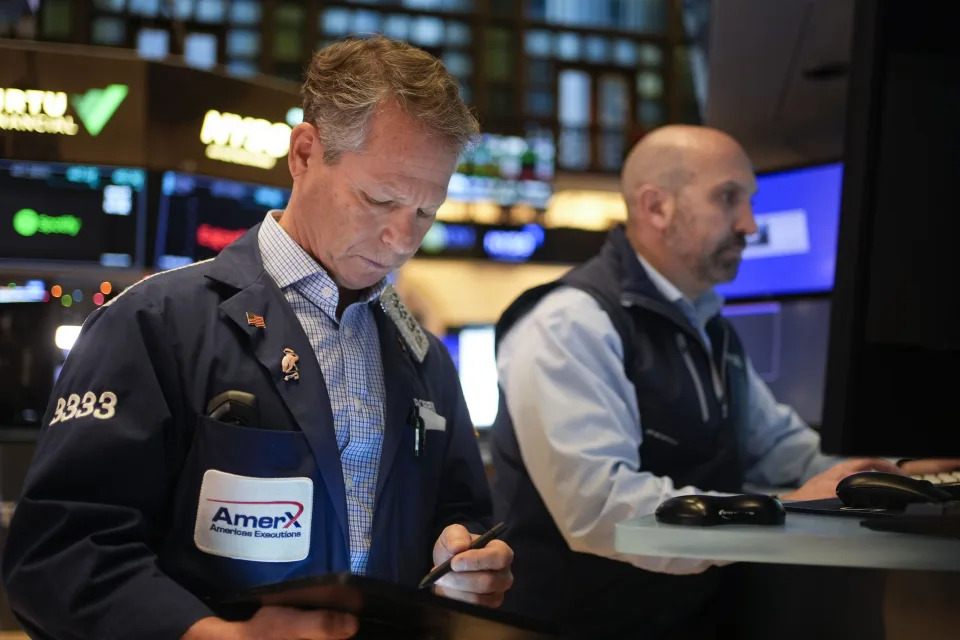The U.S. stock market experienced a significant decline on Tuesday, with the S&P 500 falling 1.1% after initially giving up an early gain. The Dow Jones Industrial Average dropped by 178 points, or 0.4%, while the Nasdaq composite tumbled 1.9%. This downturn was largely attributed to rising yields in the bond market, which surged immediately following the release of encouraging reports on the economy.
Strong Economy and Rising Yields
The strong reports on the job market and business activity have brought about a shift in the market’s sentiment. One report indicated that U.S. employers were advertising more job openings at the end of November than economists had anticipated, while another showed that activity for finance, retail, and other services businesses grew much faster in December than expected.
While these reports are undoubtedly good news for workers seeking employment and those concerned about a possible recession, they also pose a potential threat to inflation. A solid economy could keep pressure on inflation, making it less likely for the Federal Reserve to deliver cuts to interest rates that Wall Street eagerly anticipates.
Federal Reserve’s Interest Rate Cuts
The Federal Reserve began cutting its main interest rate in September to provide a boost to the economy. However, there have been hints of a slowdown in easing, which has contributed to expectations of fewer cuts to interest rates in 2025. This, combined with concerns about possible Trump policies, such as tax cuts, has led to worries about upward pressure on inflation.
Rising Yields and Treasury Bonds
The threat of tariffs from President-elect Donald Trump has raised concerns about possible upward pressure on inflation, which has stubbornly remained just above the Fed’s 2% target. The report on U.S. services industries from the Institute for Supply Management also contained discouraging trends on inflation, stating that price increases accelerated in December.
Expectations of fewer cuts to interest rates in 2025 have already been building for weeks, leading to higher yields on longer-term Treasury bonds. Worries about other possible Trump policies, such as tax cuts, which could swell the U.S. government’s debt and push yields even higher, have also contributed to this trend.
Higher Yields and Stock Prices
Those higher yields make Treasury bonds more attractive to investors who might otherwise buy stocks, putting downward pressure on stock prices. The super-safe bonds are paying notably more, with the yield on a 10-year Treasury climbing to 4.69% from 4.63% shortly before the release of Tuesday’s reports and from just 4.15% in early December.
Heavy Pressure on Expensive Stocks
High yields can put heavy pressure on stocks seen as the most expensive, which pulls the lens toward Nvidia and other Big Tech stocks that have soared in the frenzy around artificial-intelligence technology. Nvidia had been on track to set another all-time high in morning trading after CEO Jensen Huang unveiled a suite of new products and partnerships the night before.
Nvidia’s Decline
However, after Tuesday morning’s economic reports, which hit the market after its first half hour of trading, Nvidia swung to a loss of 6.2% and became the heaviest weight on the S&P 500. Losses for Amazon, Tesla, Apple, and Microsoft were the next-strongest forces dragging the index lower.
‘Good News is Bad News’ Environment
Now that worries from the summer about a potentially slowing U.S. economy have abated and the 10-year Treasury yield is firmly above 4.50%, "we believe the market is shifting into a ‘good news is bad news’ environment," said AP Business Writers Yuri Kageyama and Matt Ott.
Stock Market Abroad
In stock markets abroad, some notable Chinese companies fell after the U.S. Defense Department added dozens of them to a list of companies it says have ties to China’s military. The announcement caused some of the companies to protest and say they will seek to have the decision reversed.
Added to the list were gaming and technology company Tencent, artificial intelligence firm SenseTime, and the world’s biggest battery maker CATL. Tencent’s stock that trades in Hong Kong fell 7.3%. This helped pull the Hang Seng index down 1.2%, but indexes were stronger elsewhere in China and across much of Asia and Europe.
Market Recap
All told, the S&P 500 fell 66.35 points to 5,909.03. The Dow Jones Industrial Average slipped 178.20 to 42,528.36, and the Nasdaq composite sank 375.30 to 19,489.68.




